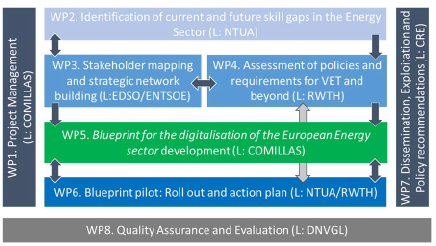Management Structure
Work Packages
The project is structured in eight work packages (WPs) to ensure an iterative development of the project to accomplish its quality and sustainability. The overall project structure ensures consistency between objectives, WPs and methodology in the most cost-effective way so as to achieve the defined results and impacts.

WP1
Project Management
Leader: Comillas Pontifical University
WP1 is a cross-sectional WP that encompasses tasks related to the Management during the project’s lifecycle. COMILLAS will be responsible of project management as Project Coordinator (PC), in coordination with the following bodies: The Project Management Board (PMB), The Project Technical Committee (PTC), Work Package Teams (WPT), The International Advisory Board (IAB) (furthers explained in part II.2). This structure will represent the industrial strategy lead of the project. To ensure the smooth implementation of the BSDE and to ensure the correct information flows between the decision-makers, management procedures and tools will be defined and implemented in this WP.
WP2
Identification of current and future skill gaps in the Energy Sector
Leader: National Technical University of Athens - NTUA
WP2 covers the Preparation tasks regarding the identification and documentation of current and future skill needs in the Energy sector, led by NTUA. This WP includes the definition of the state of the art and the vision of the Energy sector and its main technological, social and economic challenges from now to 2050. It also includes the identification of the stakeholders in the Energy Value chain (Industry, Suppliers, Researchers, VET providers, recruiters, policy makers and social representatives) and their associate skill gaps regarding digitalisation. WP2 integrates the work of previous and current EU programmes and initiatives to provide the foundations for WP3 and 4.
WP3
Stakeholder mapping and strategic network building
Leader: E.DSO for Smart Grids - E.DSO
WP3 involves Implementation tasks to create a Stakeholders’ map as a database of sector occupations and job profiles, with skills content analysis. E.DSO/ENTSO-E supported by FOSS will lead this WP to set the ground for a strategic sectoral cooperation in order to design and build a strategic network, in close relation with WP4, in order to define the networks and activities needed to establish the blueprint at regional/national /European level.
WP4
Assessment of policies and requirements for VET and beyond
Leader: Rheinisch Westfaelische Technische Hochschule Aachen - RWTH
WP4 includes the Implementation tasks for the evaluation of best practice at regional and national policies and initiatives for VET but also academic level. This WP will be led by RWTH to define how educational systems and policies at regional, national and EU level currently deliver skills to the Energy sector. A key task will be establishing (education and training) reference points (based on occupations) within existing skills delivery (formal and informal) systems. As a result, a detailed description of best practices and analysis to escalate in other European regions will be provided. Hence, the framework (integrated with the WP3 map) will become the basis for the identification and cataloguing of (existing and future) Energy sector skills and qualifications and their integration into VET systems and beyond.
WP5
Blueprint for the Digitalisation of the European Energy Sector development
Leader: Comillas Pontifical University
WP6
Blueprint pilot: Roll out and action plan
Leader: NTUA/RWTH
The BSDE will be rolled-out in a pilot demonstrator in WP6 (Blueprint pilot: Roll out and action plan), as an Implementation task led by NTUA/RWTH. WP6 will be the materialisation of WP5 for the implementation and transfer of the Blueprint at regional/national/European level. The outputs of this WP will be used to continuously update the Blueprint (WP5) in an iterative approach to ensure the sustainability of the strategy during the project but also, after the project has ended.


